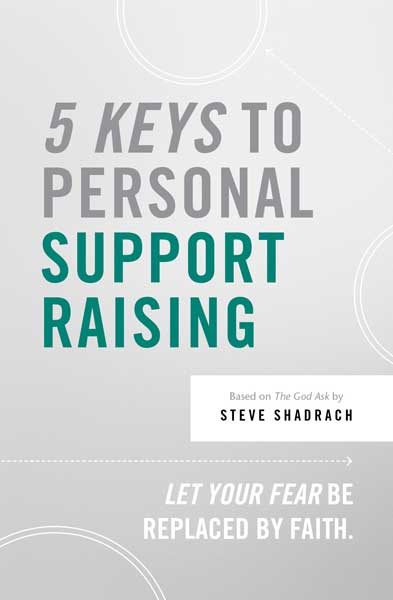
Your MPD culture is healthy if…
Your cultural values are consistently and clearly communicated.
Imagine you’re a new missionary candidate captivated by the vision of a particular sending agency. When asked about raising support, the recruiter says, “God always provides for those He calls. Don’t worry about the money.”
The HR team says, “We’ll train you and coach you in the process, but you should expect it to take 3-9 months of dedicated hard work to reach full funding.”
The field leader says, “You can live on a lot less than what those guys are telling you. The important thing is to get here as quickly as possible.”
As a missionary candidate is your head spinning with questions like who do I believe, what’s my next step, and how does all this work?
Too often MPD culture in an organization is unspoken and undefined, leading to confusion and poor execution like the above example.
Organizational culture includes an organization’s expectations, experiences, philosophy, as well as the values that guide member behavior. Culture is expressed in member self-image, inner workings, interactions with the outside world, and future expectations. A healthy culture is clearly defined, articulating all the aspects above.
Can you and your leadership define your MPD culture in a unified way? Is there congruence between what is written and what is lived out? Until you can clearly articulate your culture, you will be like a kite blown about by the wind.
Your MPD culture is healthy if…
Your clear framework empowers freedom and rewards competence.
You are a missionary candidate in your initial stages of MPD for your agency when a new policy is instituted preventing you from taking a salary until you reach full support.
Previously, another missionary candidate on MPD was drawing a salary and deficit spending, then left the agency with a large negative balance. The agency leadership decided that could never happen again so they created an agency-wide policy preventing candidates from drawing a salary while initially raising funds.
How do you feel now as the candidate?
You probably have heard the phrase “hunt for the guilty, punish the innocent, and reward the uninvolved.” That’s exactly what happened in the above example.
The person leaving the mission felt none of the impact of their behavior, while innocent people who never violated the policy now have to live with its impact, and the uninvolved leaders celebrate a policy decision. This is how unhealthy cultures manage their framework.
Jim Collins says: “The purpose of bureaucracy is to compensate for incompetence and lack of discipline…most companies build their bureaucratic rules to manage the small percentage of wrong people on the bus which drives away the right people on the bus” (“Good to Great” p. 121).
Healthy MPD culture focuses on the behaviors that produce the outcomes essential to successful support raising and rids itself of unnecessary restrictions or bureaucracy.
One way to tell if your MPD culture is healthy is if your framework, structure, policy and procedures are aimed at those who demonstrate responsibility or at the few who lack discipline and competence. Do you have to keep increasing bureaucracy to manage increasing incompetence and poor work ethic?
In the situation above a good solution might be to have MPD staff submit a salary request based on the monthly support level they currently have coming in approved by their MPD coach rather than having a blanket policy preventing people from taking salary.
Your MPD culture is healthy if…
You choose self-disciplined people who are willing to go to great lengths to fulfill their responsibilities.
Visualize with me a missionary candidate who regularly has to be reminded of deadlines in the application process. Once appointed they continue to be late with deadlines, show up unprepared for MPD coaching sessions and miss the weekly targets for MPD. They are evasive in answering questions about their time usage and communicate that the methodology of MPD isn’t working for them. They push responsibility back on the MPD coach to find another way for them to be successful at raising support. The candidate eventually misses enough goals and lacks progress to the point where HR is having discussions about separation from the agency. Leadership decides to keep the staff because the need on the field is great, and the staff is launched to the field underfunded.
Unhealthy organizations hire people who don’t fit their culture. Driven by need or a scarcity of resources mentality, these hires create a division between written culture and actual culture.
Exceptions to culture, such as hiring someone who doesn’t perform within the framework, reinforce that the written culture lacks value and encourage staff to continue in non-conformity.
Healthy MPD cultures have the resolve to hire people who will go to extreme lengths to complete their responsibilities in the culture and say no to those who do not show that level of commitment. They are driven by purpose and vision rather than immediate need.
Healthy MPD cultures don’t enable poor discipline or incompetence. You may have heard “when I am working harder on your problem than you are, it’s time for me to re-evaluate my role in the situation.” If you are working harder at raising a staff’s support than they are, it’s a clear sign of their lack of commitment to being disciplined and responsible for their own success.
As an MPD leader, you have to champion your MPD culture. Henry Cloud says it this way in “Boundaries for Leaders:” “You have what you allow.”
The MPD culture your organization allows is demonstrated by the people you hire and their commitment to achieving the tasks set before them.
Healthy cultures are great at identifying people with “the willingness to go to extreme lengths to fulfill their responsibilities” because their culture gives them clear marks of what to look for (Collins, p. 124). When this happens there is congruence between written and actual culture.
Your MPD culture is healthy if…
- All of these aspects of organizational culture are clearly articulated and defined: expectations, experiences, philosophy, as well as the values that guide member behavior in inner workings, interactions with the outside world, and future expectations.
- Your framework, policies and procedures focus on the behaviors that produce the outcomes essential to successful support raising and rid themselves of unnecessary restrictions or bureaucracy.
- You have the resolve to hire people who will go to extreme lengths to complete their responsibilities in the culture and say no to those who do not show that level of commitment.
Culture develops from multiple directions—the vision cast by leadership, whether you are leaning into the strengths of staff or compensating for the challenges, and how new staff add to or detract from that cultural momentum.
As you read through this list, what diagnosis do you take away from this check up? Where can your organizational MPD culture take one more step towards health?

